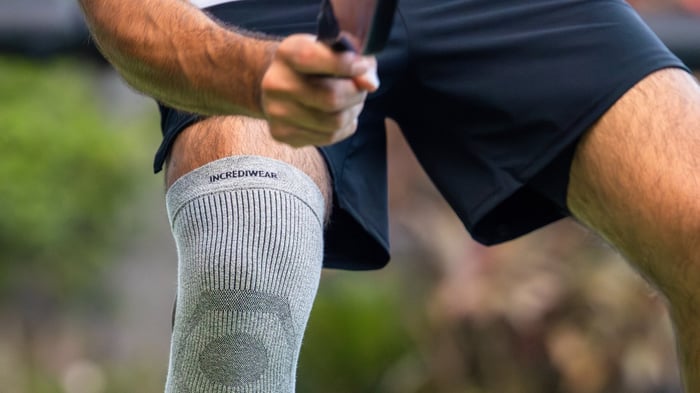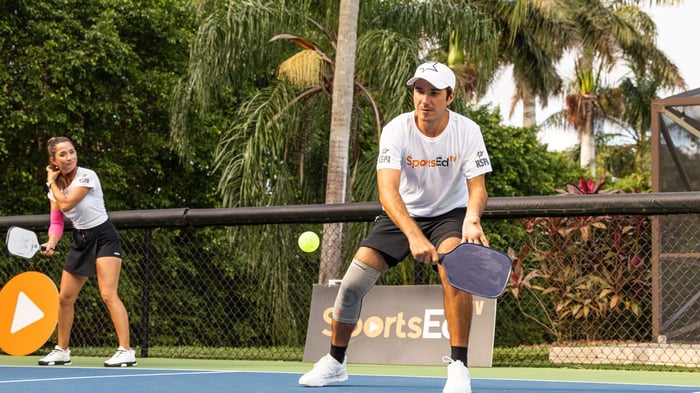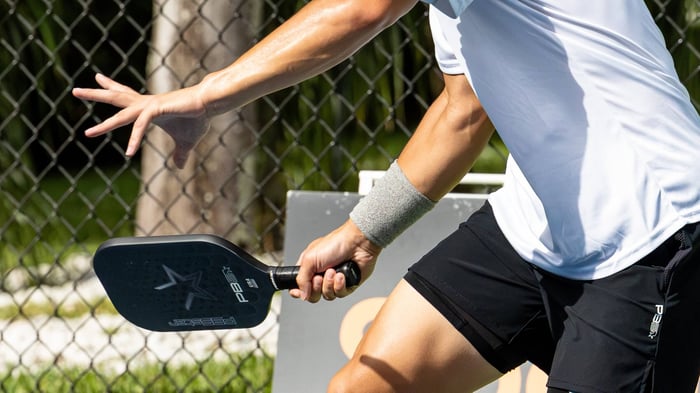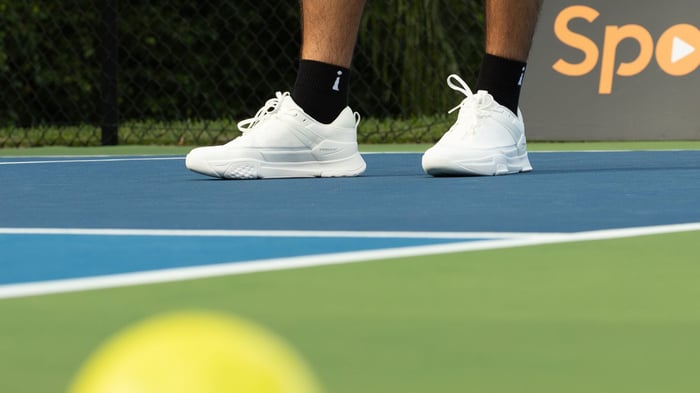Key takeaways:
Dynamic warm-ups and proper footwear are essential for injury prevention and optimal performance on the pickleball court.
Smart nutrition and hydration strategies fuel your game and aid in faster recovery post-match.
Incorporating recovery routines, rest days, and social connections enhances physical and mental wellness for long-term pickleball enjoyment.
Pickleball health tips play a vital role in helping players stay active, confident, and injury-free both on and off the court. This sport offers more than just friendly competition; it builds lasting connections, promotes physical fitness, and supports long-term wellness for players of all ages. Every time you step onto the court, you invest in your body, community, and future.
With the right approach to wellness, players can shift from simply participating to truly thriving. From dynamic warm-ups and smart nutrition to injury prevention and effective recovery strategies, these pickleball health tips are designed to elevate your game and protect your longevity in the sport. At PB5star, we empower players with the tools and knowledge to stay strong, sharp, and game-ready.
Start strong: warm-up exercises every pickleball player should know
Your body deserves a proper introduction to the game before stepping onto the court. Dynamic warm-up exercises for pickleball players prepare your muscles and joints for quick lateral movements, sudden stops, and overhead reaches. Unlike static stretching, these movement-based exercises activate the specific muscle groups you'll rely on during play.
A focused warm-up routine is even more valuable as we age, helping reduce the risk of strains and overuse injuries. Moving through these dynamic exercises five to ten minutes before each session can make the difference between playing confidently and dealing with soreness later. When properly warmed up, you move with fluidity and can focus on strategy rather than stiffness, enhancing your overall performance on the court.
Play smart: injury prevention and safe movement on the court
Smart players know the best game is one where everyone stays healthy and returns tomorrow ready to play. The key to long-term pickleball enjoyment is thoughtful gear, movement, and body awareness choices. Players who do not gradually build up their playing time are at a much higher risk of sustaining injuries.
Invest in proper athletic shoes: Choose footwear for pickleball with strong lateral support and traction. Features like Dynamic Stability Assist™ help prevent slips and reduce joint stress during quick directional changes.
Focus on solid footwork: Stay light on your feet, maintain a balanced stance, and position yourself well to avoid overreaching or awkward lunges that increase your fall risk.
Play within your limits: Use controlled aggression to stay competitive without overextending yourself. Chasing risky shots off-balance often leads to unnecessary injuries.
Listen to your body's signals: Take breaks when needed and respect signs of fatigue or discomfort to prevent long-term strain and keep your sessions productive.
Communicate with your partner: Talk during doubles play to prevent collisions and confusion, especially near the kitchen line, where movement is tight.
The right gear, good communication, and body awareness help you stay in the game longer and stronger. By moving purposefully and protecting your physical health, you set yourself up for years of confident, enjoyable pickleball.
Fuel to win: nutrition and hydration for pickleball performance
Smart nutrition choices can make the difference between feeling energized throughout your match and hitting a wall halfway through. Since pickleball matches typically last 60-90 minutes, knowing what to eat before and after playing pickleball helps you maintain peak performance and recover faster.
Fuel with complex carbohydrates 2-3 hours before play: Choose whole grain toast with banana, oatmeal with berries, or brown rice with lean chicken to provide steady energy without crashing mid-game.
Hydrate strategically throughout your session: Drink water consistently before, during, and after matches, and consider adding electrolytes since sweat sodium loss varies dramatically between players.
Pack protein-rich recovery snacks: Within 30 minutes post-match, reach for Greek yogurt with nuts, a turkey sandwich, or chocolate milk to help your muscles repair and rebuild.
Time your pre-game fuel wisely: If you're eating closer to match time, stick with easily digestible options like a banana or a small handful of dates to avoid feeling sluggish on the court.
Listen to your body's hydration cues: Older adults may not feel thirsty as readily, so make it a habit to sip water regularly rather than waiting for thirst signals to kick in.
Proper nutrition and hydration habits support better pickleball performance and lay the groundwork for consistency, endurance, and faster recovery. By fueling with purpose before play, staying hydrated throughout, and replenishing wisely afterward, you give your body what it needs to compete at its best every time you step on the court.
Recover right: post-game routines for faster recovery
The moments after you finish playing can make a big difference in how quickly you recover and how well you perform next time. Just 10–15 minutes of gentle stretching and foam rolling helps your muscles relax, especially your calves, hamstrings, and shoulders. Hydration is just as important; restoring fluids improves muscle function and shortens recovery time. A protein-rich snack with carbs within 30 minutes of finishing gives your muscles what they need to rebuild.
Sleep and relaxation round out your recovery routine. Quality sleep helps your body repair and lock in the skills you practiced on the court. A simple wind-down routine, like deep breathing or light stretching, can make sleep more effective. Even post-game chats with friends, whether over coffee or during a cooldown walk, offer mental rest and build social bonds. These moments help you process the day’s matches while reinforcing the community spirit that makes pickleball rewarding.
Quick-read: top pickleball health tips at a glance
Whether you're sharing tips with fellow players or looking to stay at the top of your game, these core health strategies will keep you playing with confidence and energy. Here's your go-to pickleball health tips summary for staying strong on the court.
Warm up with purpose: Start every session with dynamic stretches and light cardio to prepare your muscles and joints for the unique movements pickleball demands.
Choose supportive footwear: Invest in court-specific shoes with good traction and lateral support to prevent ankle injuries and maintain stability during quick direction changes.
Eat and hydrate strategically: Consume balanced meals rich in carbohydrates and lean proteins, and drink water before, during, and after play.
Prioritize recovery and connection: Incorporate gentle stretching, adequate rest, and social time with fellow players to support both physical recovery and mental wellness.
Listen to your body and take rest days when needed: Pay attention to early signs of fatigue or discomfort, and remember that proper hydration significantly improves sports performance and reduces injury risk.
Staying healthy on the court comes down to consistent, intentional choices. From warming up with care to fueling smart and prioritizing recovery, these pickleball health tips help you play harder, last longer, and enjoy every match. Make these habits part of your routine, and you’ll stay strong, sharp, and ready for whatever the next rally brings.
Play better, feel better, look your best
Pickleball offers more than just a workout; it’s a gateway to community, confidence, and lasting well-being. The sport’s inclusive spirit and social nature create powerful connections that elevate your physical and mental health. When you feel supported by performance-driven gear like the PB5 Court 2 shoes and premium apparel designed for movement, that confidence carries into every rally and interaction on the court.
Whether you're mentoring new players or leading local events, pickleball brings people together through shared passion and purpose. Fuel your connection to the game and the community that comes with it by exploring PB5star’s collection of apparel and footwear built for players who play with heart.
FAQs
What are the best warm-up exercises for pickleball players?
Incorporate dynamic movements that mirror the actions you'll perform during play. Arm circles, leg swings, hip rotations, and controlled lunges activate the specific muscle groups pickleball demands while increasing blood flow and joint mobility. The ISSA recommends dedicating 5-10 minutes to light cardio followed by sport-specific movements rather than static stretching before stepping onto the court.
How do I recover quickly after a pickleball match?
Post-match recovery begins immediately with gentle stretching and consistent hydration. Cool down with light walking and static stretches that target your shoulders, hips, and calves, then replenish the fluids and electrolytes your body used during play. Quality sleep and scheduled rest days between intense sessions give your muscles the time they need to repair and strengthen for your next match.
What should I eat before and after playing pickleball?
Pre-game nutrition works best when you combine complex carbohydrates with lean protein about 2-3 hours before play. Think oatmeal topped with fruit or a turkey sandwich on whole-grain bread. Post-match, your muscles crave protein and healthy carbs within 30 minutes of finishing play. Making Greek yogurt with berries or a banana with almond butter is a perfect recovery snack. Consistent hydration, not just during matches, supports peak performance and prevents cramping.
Should I play through minor aches and pains?
After a good match, normal muscle soreness differs significantly from sharp pain or persistent discomfort that signals potential injury. When your body sends warning signals, taking time to rest and recover prevents minor issues from becoming major problems that could sideline you for weeks.








